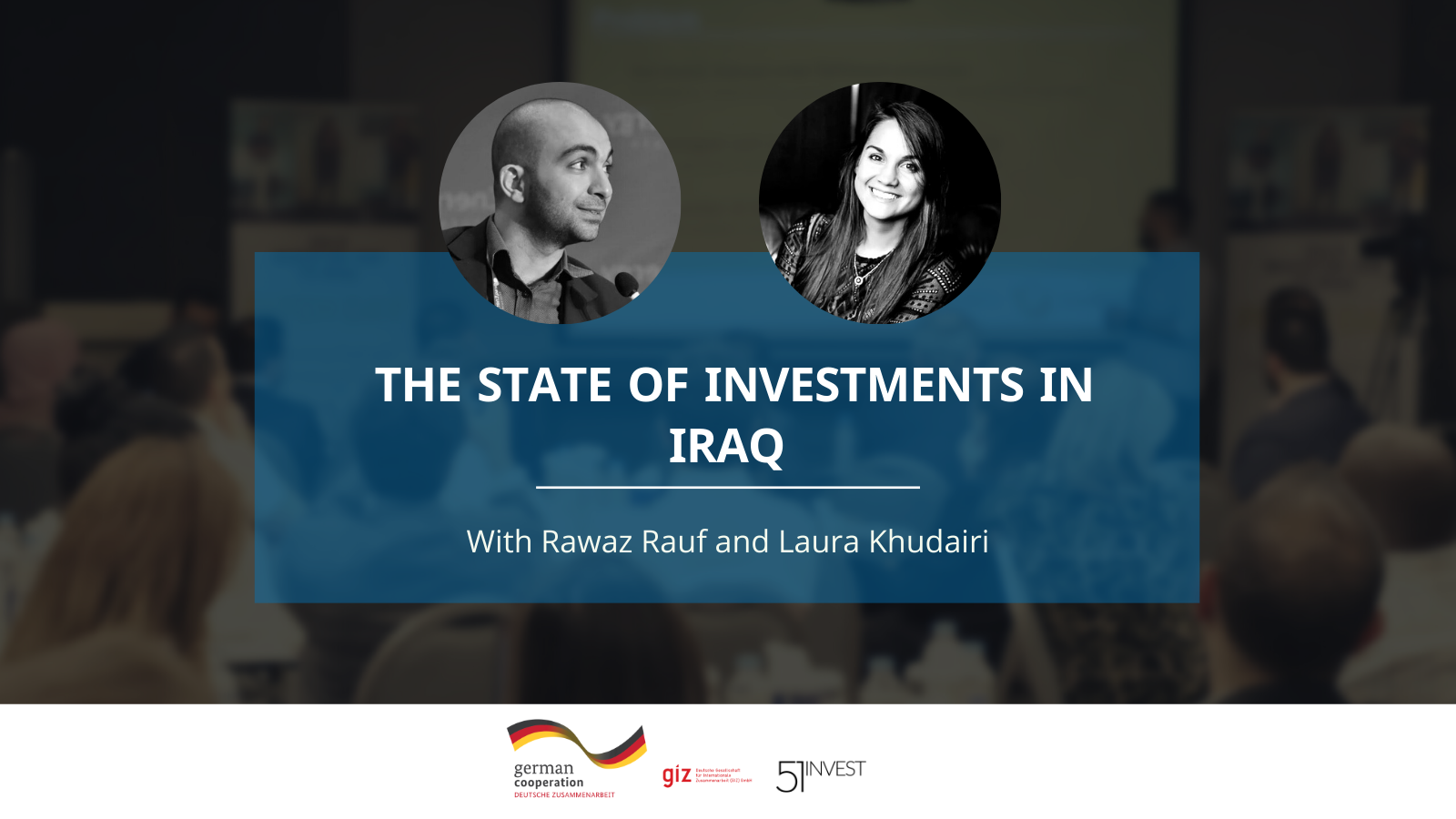A panel discussion on the state of investment in Iraq
On January 27th, 2022, Five One Invest hosted a Speaker Series session with Laura Olivier Khudairi (Executive Director, Iraq Tech Ventures) and Rawaz Rauf (Partner, Euphrates Ventures). The panel discussion touched on regional and local startup industry trends, investment opportunities, and investor activity in Iraq.
Before joining Euphrates Ventures as a partner, Rawaz Rauf embarked upon his investment journey as an angel investor. As the startup scene in Iraq developed, the entrepreneurial ecosystem has entered “an accelerated mode of venture capital interest.” So, in July 2021, the Euphrates Ventures was created. The $20M fund invests in tech-enabled and highly scalable startups with a ticket size of anywhere between $100K to $4M. Rawaz explained, “We're looking at tech disruptors. You know, what we need from founders and entrepreneurs are people that are not afraid to disrupt the status quo.”
Laura Olivier Khudairi and her husband, Mohamad Khudairi, began their investment journey to help the Iraqi economy diversify away from oil and gas dependency towards more sustainable sectors such as technology. Recently Laura and Mohamad launched Iraq Venture Partners, a partnership with veteran Iraqi ecosystem players Omar Al-Handal (The Station, Al Handal International Group) and Bassam Falah (Innovest ME, Ruwwad Al Iraq). The fund is still fundraising; however, the fund’s goal is to raise $20M focused on early-stage opportunities (preseed to series A). The fund is sector agnostic, and like Euphrates Ventures, it looks for tech-enabled and highly scalable startups.
The Catalyst to Institutional Investing
As the excitement mounted around the surge of startups in Iraq, investor interest piqued. The panelists mentioned several catalysts that have spurred, such as:
Rise of quality of startups.
A clear path to a startup exit with solid economic return potential.
Infrastructural progress, such as the availability of broadband / 4G and accessible internet prices.
An improvement in Iraq’s security situation.
The proliferation of entrepreneurship programs and upstream organizations.
An increase in government support for a knowledge economy.
In addition to attracting the interest of local institutional investors, the above catalysts have also appealed to regional investors and global venture capitalists interested in “emerging markets” (note the Baly investment round in January 2022).
Startup Industry Trends
During the discussion, Rawaz emphasized that Iraqi entrepreneurs need to stay abreast of regional and international trends. Competition is no longer only from Iraq; it also comes from regional companies looking to expand into the Iraqi market. Emerging sectoral trends that the panelists are witnessing regionally include edtech, servicing platforms, e-commerce, healthtech, fintech, and logistics. For such sectors to succeed in Iraq, they need to be adapted to local market needs.
For instance, when it comes to education, startups should focus on platforms for tutoring, university exam preparation, post-university programs equipping graduates for the workforce (language studies, programming, UX, UI, entrepreneurship, digital content, and soft skills). Both panelists remained skeptical of servicing platforms like handyman services or babysitting services. Both believe there is little consensus among the target audience on defining a “professional” service provider and what qualifications/certifications these service providers should hold.
Healthtech, like edtech, needs to adapt itself to the needs of the local market. Healthtech is perceived as a tricky sector to nail down. There is a big population of doctors with a wealth of experience, yet they are set in their ways. It is hard to attract them as users of technology. There are a lot of young fresh graduates within the medical field who would be great candidates in adopting such technologies. Startups need to be savvy in navigating the medical field force.
On the other hand, e-commerce is predicted to be one of the biggest disruptors. So far in Iraq, it only occupies a small portion of the shopping experience. However, regionally, tech startups have disrupted retail sectors from grocery stores to pharmacies. Also, logistics, transport, and distribution will continue to grow. Iraq being import-dependent means that companies are looking to disrupt the transport business.
Regionally and globally, fintech is attracting a lot of attention. In Iraq, however, fintech has been chiefly focused on the payroll - salary disbursements of the government to government employees. There is definitely much room for product and service expansion, mainly aimed at the private sector. Fintech will be pretty exciting as Iraq moves from oil dependency to a private sector-driven economy.
Impact of Regional Players on the Ecosystem
Many international and regional players, such as ZoodPay and Talabat, have started expanding their operations into the Iraqi market. Although such players come with a plethora of experience and capital resources, what will set local Iraqi startups apart from the regional entrants is their market know-how. This is what gives Iraqi startups their competitive edge. Laura noted, “Careem tried to do food delivery in Iraq and stopped those operations because Careem made mistakes that Alsaree3 had already learned.”
Another advantage that local startups have is retaining and attracting local talent. Alsaree3 and Miswag have worked hard to create a strong company culture where talent has no incentive to leave. Local startups provide their team with the right mix of culture, benefits, incentives, and the ability to execute and collect.
Rawaz also maintained some skepticism of international players who claim to be entering “the Iraqi market.” International players do not realize that Iraq is a big fragmented market, not one homogenous market. Every governorate and city requires different marketing, sales, payments, etc. In each region, there are different customer expectations. And thus, without access to knowledge of the local consumer landscape, it is hard for international players to penetrate the market.
Investor Support
Other than funding, startups need a lot of guidance, support, and mentorship. Both Euphrates Ventures and Iraq Venture Partners value startup support and have their own approach. Iraq Venture Partners will launch an investment readiness program. There will be two levels to the program. The first level is aimed at early-stage startups, while the second level is aimed at companies with market traction. The first level offers early-stage startups with administrative and set-up support, such as licensing and registration – basically fundamental elements to allow these startups to be “investable.” The second level offers startups access to regional suppliers and mentorship opportunities from other industry leaders. One element that both levels have in common is fundraising support. A significant component of the program is to prepare startups for fundraising. This investment readiness approach has been modeled from other venture capital funds that have developed programs like this aimed in other similar nascent markets.
On the other hand, Euphrates Ventures focuses on a startup's business model. As Rawaz explained, “We primarily look at, how can we make the business disruptive to the rest of the sector? What kind of business model can the startups leverage, and what kind of partnerships can they strike in the market?”
Final Words of Wisdom
It is not a prerequisite for investment that a startup join an entrepreneurship program (incubator or accelerator). However, Rawaz recognizes that participating in such programs gives startups a competitive boost. Startups will have better decks, better pitch skills, and better negotiation skills.
Iraqi startups were advised to keep two things in mind. First, ideas are cheap, but execution is brutal. Euphrates Ventures expects to see startups with real market traction and skin in the game. Second is the ability to retain talent, especially core talent that will build and grow the business. Rawaz highlighted, “We have pushed for employee stock options as a way of retaining talent. We want to ensure that the core team does not abandon the business.”

